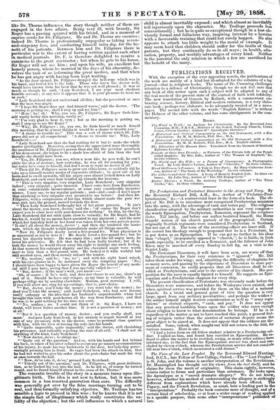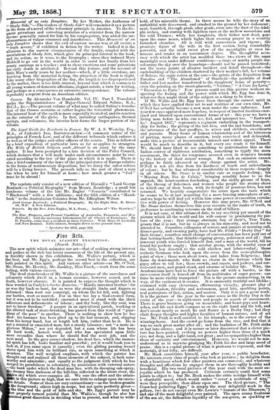PUBLICATIONS RECEIVED.
BOOKS.
Thy Word is Truth : an Apology for Christianity. By the Reverend John Cumming, D.D., F.R.S.E., Minister of the Scotch National Church, Crown Court, Covent Garden ; Author of " Apocalyptic Sketches."
A Historical and Critical Commentary on the Old Testament, with a New Translation. By M. M. Kalisch, Phil. Doc., M.A.
A Historical and Critical Commentary on the Old Testament, with a New Translation. By M. M. Kalisch, Phil. Doc., M.A. English edition.
The Education of the Human Race. Translated from the German of Gotthold Ephraim Lessing.
Friends at their Own Fireside ; or Pictures of the Private Life of the People called Quakers. By Mrs. Ellis, Author of "The Women of England," he. In two volumes.
The World and His Wife; or a Person of Consequence. A Photographic Novel. By Lady Bulwer Lytton, Author of " Cheveley." In three volumes. Maud Skillieorne's Penance. A Tale in Two Parts. By Mary Catherine Jack- son, Author of " The Story of My Wardship." In two volumes.
The Gilberts and their Guests. A Story of Homely English Life. In three vo- lumes. By Julia Day, Author of " The Old Engagement."
Doctor Thorne ; a Novel. By Anthony Trollope. Author of "The Three Clerks," he. In three volumes.
The Presbyterian and Protestant .Dissenter in the Army and Navy. By the Reverend Richard Dill, A.M., &c., Author of "Prelatico-Pres- byterianism," &c.—A controversial tract in the form of a book. The ob- ject of Mr. Dill is to introduce more recognized Presbyterian ministers into the army, with the advantage of rank and better pay. The religious classification adopted by the military authorities is not very complex— the words Episcopalian, Presbyterian, Romanist, represent the reliOanes licitee. Till lately, and before our author bestirred himself, the Horse Guards' notion of his church partook of the geographical. Certain originally Scottish regiments were considered Presbyterian in Scotland, but not out of it. The tests of the recruiting-officer are laxer still. If the recruit has theology enough to propound that he is a Protestant, he is put down as an Episcopalian. If he can get no further in his ideas than " chapel," (as popularly opposed to " church,") he is liable, in Irish hands especially, to be enrolled as a Romanist, and the follower of John Knox may be marched off every Sunday in full fig, on a visit to the Scarlet Lady.
The Protestant Dissenters, it will have been seen, are worse off than the Presbyterians, for their very existence is " ignored." Mr. Dill takes them under his wing; and, admitting the difficulty of chaplains for so many sects, and passing by the objections of Dissenters to state pay- ment or connexion, he coolly proposes that all Dissenters shall be en- rolled as Presbyterians, and sent to the service of his church. His pro- position for the navy is equally limited to himself. He suggests an Epis- copalian and a Presbyterian chaplain for every ship.
The present classification of Protestants was obviously made before the Dissenters were numerous, and before the Wesleyans even existed, and when spiritual service was provided for them on the idea of a national church. In a broad and general point of view the question is very large, apart from any military peculiarities ; and perhaps the wishes o the soldier himself might deserve consideration as well as " army regu- lations" or clerical etiquette, " rank, and pay." It does not appear that any practical hardship bears upon the soldier who cares enough about religion to know to what denomination he belongs. If he is so regardless of the matter as not to have reached this point, a general feel- ing of religion rather than the niceties of sectarian dispute seems the great object to be aimed at. It does not appear that the soldiers are dis- satisfied. Some, indeed, when sought out will not return to the fold, for various reasons. Here is one.
" I had a letter from an old fellow student relative to a Presbyterian sol- dier. I called on him, and found him enrolled an Episcopalian. He re- fused to allow the matter to be rectified, owing, as many other soldiers have informed me, to the fact that the Episcopalian service was short and con- cluded by eleven o'clock, whereas the Presbyterian service did not concludetill near two o'clock, which occasioned a cold dinner." With the exception of the over appearing novels, the publications of the week are mainly of a kind but ill-adapted for the columns of a lay journal—that is, religious books. The name of Dr. Cumming challenges attention to a defence of Christianity, though we do not feel sure that any book of this writer upon such a subject will be adapted to any of the real needs of the present state of the contest of faith with infidelity. The new translation of Genesis by Kalisch, with a commentary em- bracing science, history, Biblical and modern criticism, is a very elabo- rate book ; perhaps too elaborate to be adequately treated of in a news- paper. The second title with the words "English Edition" is without the Hebrew of the other volume, and has some abridgments in the com- mentary.
The Voice of the Last Prophet. By the Reverend Edward Hunting= ford, D.C.L., late Fellow of New College, Oxford.—The " Last Prophet". is St. John, and the volume is another interpretation of the Revelations.' Dr. Huntingford has thought out his views from the text itself, and he claims for them the merit of originality. This claim rightly, however, relates rather to forms and particulars than substance. He looks upon the Apocalypse as a "sacred dramatic allegory." We do not know, however, whether his method of understanding the allegory is strikingly different from explanations which have already been offered. Papacy, and the French Revolution, as usual, bear a leading part in the "interpretation." Probably the book contains more of thought, and of a certain kind of scholarship, er at least a wider range of reading applied to a specific purpose, than some other "interpretations" published of late. Memorial of an only Daughter. By her Mother, the Authoress of " Shady Side."—The readers of Shady Side* will remember it as a picture in the form of a novel of the voluntary principle in America. To the fre- quent privations and corroding anxieties of a minister from the narrow income generally raised for him by his congregation, was added the un- pleasantness of vulgar comment and interference. This Memorial of an only Daughter shows that the evil of narrow means was at all events a a truth severe," if exhibited in fiction by the writer. Indeed it is the allusions to the narrow circumstances of the family, coupled with the associations of Shady Side, which give its principal interest to the book, and its action, as it were, to the biography ; since they induced Mary Hubbell to go out in the world in order to assist her family from her scanty earnings as a teacher ; and to these exertions and some privations her early death is attributed. Beyond this feature, and the account of little Mary's early years by her mother—which, if a little overdone, are touching from the maternal feeling, the attraction of the book is slight. Like many other biographies of the day, the length is too disproportioned to the matter, there is too little interest, beyond that which is common to all young women of domestic affections, elegant minds, a turn for writing, and perhaps as a consequence an extensive correspondence. The volume is probably a reprint from an American edition.
Cosmos. By Alexander Von Humboldt. Vol. IV. Part I. Translated under the Superintendence of Major-General Edward Sabine, RA., D.C.L., &c.—The present volume of what may be called Sabine's transla- tion of the Cosmos contains or rather begins the terrestrial phenomena. The internal heat of the earth is more especially treated of, and its reaction on the exterior of the globe. In fact, including earthquakes, thermal springs, and volcanoes, the interior heat forms the larger portion of the volume.
The Legal Guide for Residents in France. By W. A. S. Westoby, Esq., M.A., of Lidcoln's Inn, Barrister-at-law.—A summary notice of the principles of French Law, and of the different tribunals which enforce it as well as of the judges and other officers of the courts. This is followed by a brief exposition of particular laws so far as applies to strangers. The Wills of British Subjects made Abroad is an essay by the same author. It has been prompted by a late decision of the Privy Council, which declares that a will made under such circumstances must be exe- cuted according to the law of the place in which it is made. There is also a brief summary of the laws of the principal states of Europe relative to the forms of testamentary disposition, but we fancy the safest referee will be a living lawyer. The proverb tells us the sort of client a man has when he acts for himself at home ; how much greater a "fool" must he be abroad !
The reprints only consist of a new edition of Disraeli's "Lord George Bentinek—a Political Biography" from Messrs. Routledge ; a small but handsome volume of the late Mr. Eagles' " Sonnets " contributed to "Blackwood" with a few additions; and the fifth edition of a "Hand- book" to the Australasian Colonies from Mr. -Effingham Wilson.
Lord George Bentinek: a Political Biography. By the Right Hon. B. Disra- eli, M.P. A New Edition.
Sonnets. By the Rev. John Eagles, M.A. Oxon., Author of " The Sketcher,"
8tc.
The Bin, Progress, and Present Condition of Australia, Tasmania, and New Zealand ; with the necessary Information for all Classes of Emigrants. By D. Puseley, some time a resident in these Colonies. With Maps of Australia and New Zealand. Fifth edition, brought down to the present time.
• Spectator for 1854, page 910.



























 Previous page
Previous page